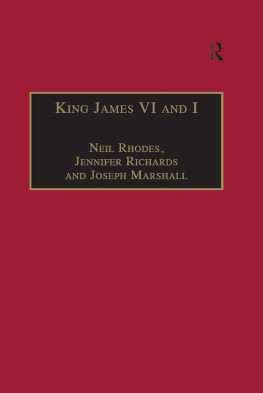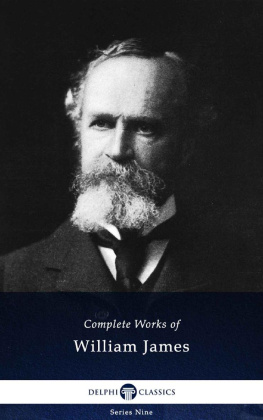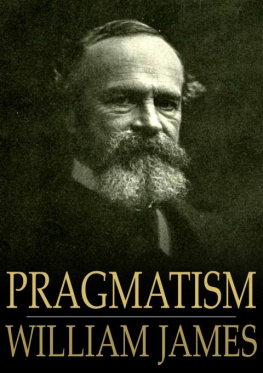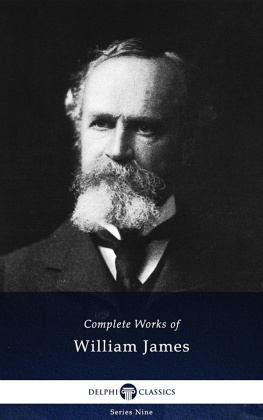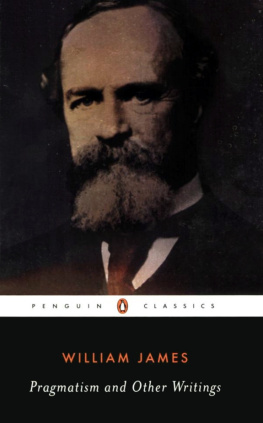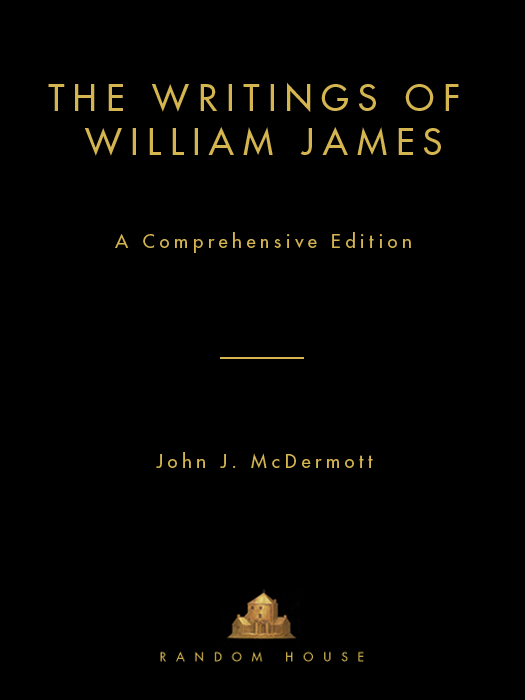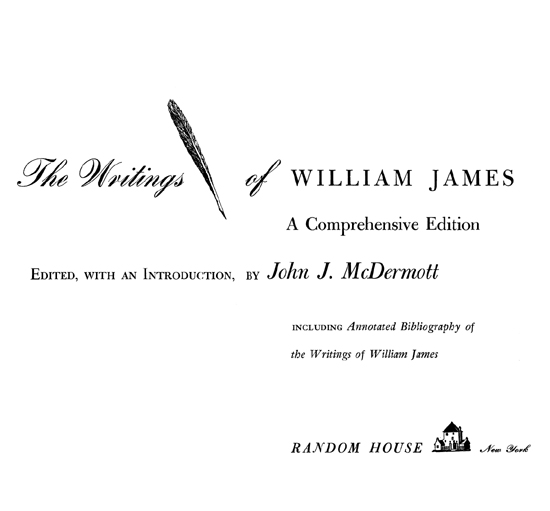Copyright, 1967, by Random House, Inc.
All rights reserved under International and Pan-American Copyright Conventions. Published in New York by Random House, Inc., and simultaneously in Toronto, Canada, by Random House of Canada Limited.
Permission to publish material from the following works of William James was kindly given by Paul R. Reynolds, Inc.: Pragmatism (New York, Longmans Green and Co., 1907) (Copyright 1907, by William James). The Meaning of Truth (New York, Longmans Green and Co. 1909) (Copyright 1909, by William James). A Pluralistic Universe (New York, Longmans Green and Co. 1909) (Copyright 1909, by William James). Some Problems of Philosophy (New York, Longmans Green and Co. 1911) (Copyright 1911, by Henry James, Jr.). Memories and Studies (New York, Longmans Green and Co., 1911) (Copyright 1911, by Henry James, Jr.). Essays in Radical Empiricism (New York, Longmans Green and Co., 1912) (Copyright 1912, by Henry James). Collected Essays and Reviews (New York, Longmans Green and Co., 1920) (Copyright 1920, by Longmans Green and Co.). The Letters of William James (Boston, The Atlantic Monthly Press, 1920) (Copyright 1920, by Henry James). The Thought and Character of William James (Boston, Little, Brown and Company, 1935) (Copyright 1935, by Henry James).
Permission to publish Annotated Bibliography of the Writings of William James (New York, Longmans Green & Co., 1920) was kindly given by David McKay Co., Inc. (Copyright 1920, by Longmans Green and Co.).
Library of Congress Catalog Card Number: 6711593
eISBN: 978-0-307-82479-0
v3.1
Let me repeat once more that a mans vision
is the great fact about him.
A Pluralistic Universe
Preface
William James was involved polemically with most of the major figures and crucial issues of his time. When read as a whole, however, his work is remarkably free from being dated. Even when tied to specific data and problems no longer relevant, Jamess version of reality has a subtlety and direction that is still profoundly important. His uncanny sense for living issues should not be thought to be overshadowed by his affection for discrete events and idiomatic expression. Those thinkers of our time who contend that James is meaningful for contemporary thought because he anticipates certain specific philosophical concerns or analyses of experience, actually sell him short. His relevance lies in his ability to offer philosophical insight of the kind which refuses to be localized by any strictly circumscribed method or doctrine. James was neither a phenomenologist nor an existentialist. And, as will be discussed at greater length in the Introduction, to speak of James as a pragmatist is also inadequate. He was a genius of his own kind, who gave to philosophy, largely by virtue of his personal qualities, a perspective and a context wholly novel in implication.
With James, the philosophical enterprise begins anew, for if one is imbued with his viewpoint, nothing is seen in quite the same way again. He once said that there can be no difference anywhere that doesnt make a difference elsewhere (Pragm., 4950). The most signal instance of this truth is the reading of James himself, who helps us to restructure our very context of apprehension. In the most basic sense, James is a seminal thinker. It is, therefore, extremely important that the public mind, for whom he primarily wrote, more fully realize his originality and relevance. Not only in his inspirational essays, but in his technical thought as well, James had everyday experience in view, and he devoted a long series of lectures and articles to the articulation of psychological and philosophical truths, for the purpose of enhancing the immediate situation. He was, in fact, a meliorist and saw philosophy itself as the habit of always seeing an alternative (L.W.J.I, 190).
Unfortunately, James has been approached, in the main, from primarily two vantage points: his doctrine of the Will to Believe and his Pragmatism. While both of these concerns in James are intriguing and carry important philosophical implications, they are subject to grave distortions if seen apart from his insight into the meaning of relations as formulated in his psychology and metaphysics. This, too, will be discussed in the Introduction.
In the Introduction, I have attempted to refocus the main lines of Jamess thought, to effect a continuity between his personalized philosophical vision and the complexity of his radical empiricism. By no means complete, this Introduction is not meant to be a technical exposition of his thought but, rather, an effort to urge the reading of James afresh. The recent study of William James by Edward C. Moore will provide the reader with a helpful over-all introduction to his philosophy.
The present volume is an attempt to present the full range of Jamess thought. The serious students of James will want to avail themselves of the collection of his works, including the still unpublished papers, in the Houghton Library at Harvard University. I have gathered here a group of essays that is comprehensive in scope: in addition to representative and complete selections from the Principles of Psychology, The Will to Believe and The Varieties of Religious Experience, I have reprinted the complete 1943 edition of the Essays in Radical Empiricism and A Pluralistic Universe. Also included is the original 1907 edition of Pragmatism, as well as classic selections from all of Jamess other major volumes. Of particular significance for James scholarship is the presence of a corrected and supplemented version of the Annotated Bibliography of the Writings of William James by Ralph Barton Perry.
In some instances, the arrangements of Jamess essays have been altered from the original editing provided by Ralph Barton Perry. This is not to be taken as a criticism of Perrys editions, without which students of James would be at a severe loss. Instead, the rearrangement is a function of a more comprehensive volume than has represented James in the past. Jamess punctuation and spelling, however unusual, are retained throughout.
It is to be hoped that in this new format, the breadth as well as the incisiveness of the vision of William James will be recognized and celebrated anew.
J. J. McD.
Huntington Village
New York, 1966
Introduction
PERSON, PROCESS AND THE RISK OF BELIEF
In his poem Our Country, Thoreau wrote the lines that well suggest the philosophical vision of William James.
All things invite this earths inhabitants
To rear their lives to an unheard of height
And meet the expectation of the land:
James himself had said in his essay on The Sentiment of Rationality that the inmost nature of the reality is congenial to powers which you possess (W.B. 86). In many ways, it was the attempt to structure the powers or energies of men which most occupied him. This concern found its most explicit statement in the essays collected in his Will to Believe. Further supporting evidence of the promethean quality of his thought is found throughout the



